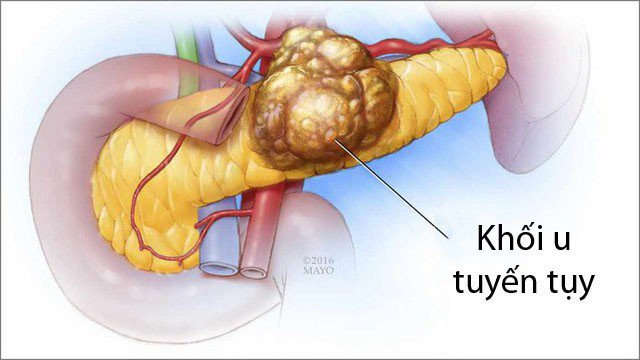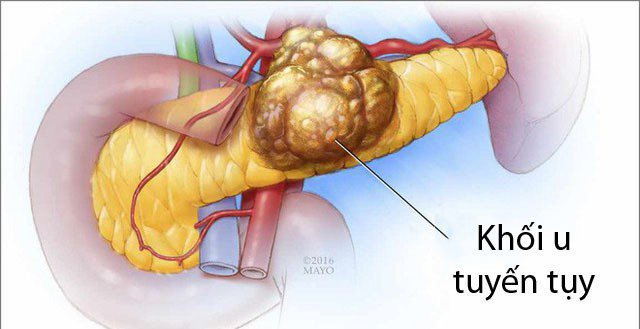Diagnosis and treatment of pancreatic cancer
To diagnose pancreatic cancer, your doctor will review your symptoms and medical history, as well as the necessary tests. Treatment for pancreatic cancer may include surgery, radiation, chemotherapy, or a combination and palliative care.
1. Diagnosis of pancreatic cancer
If your doctor suspects you have pancreatic cancer, one or more of the following tests may be ordered to confirm the diagnosis:
Imaging tests: Help your doctor see your internal organs, including including the pancreas. Some of the techniques used to diagnose pancreatic cancer include ultrasound, computed tomography (CT), magnetic resonance imaging (MRI), and positron emission tomography (PET); Endoscopic ultrasound (EUS): Combines ultrasound equipment with laparoscopic techniques to allow doctors to view the pancreas from inside the abdomen. The ultrasound probe is passed through a thin endoscope, down the esophagus and into the stomach to get images; Biopsy: A procedure to remove a small sample of tissue and examine it under a microscope. Most tissues were collected during endoscopic ultrasound (EUS). Sometimes pancreatic tissue samples are also obtained by fine-needle aspiration through the skin and into the pancreas; Blood test: Helps find specific proteins (tumor markers) secreted by pancreatic cancer cells. The tumor marker used in pancreatic cancer is CA19-9, which helps to understand response to treatment. However, there are cases where people with pancreatic cancer do not have elevated CA19-9 levels, then this test will not be possible. Once a diagnosis of pancreatic cancer has been confirmed, the doctor tries to determine the extent (stage) of the cancer. Based on the information from the test results, your doctor will tell you the stage of your cancer, as well as prescribe the most appropriate treatment for pancreatic cancer.
The stages of pancreatic cancer are divided from 0 to IV. The lowest stage shows that cancer cells are confined to the pancreas. By stage IV, the tumor has spread to other parts of the body.
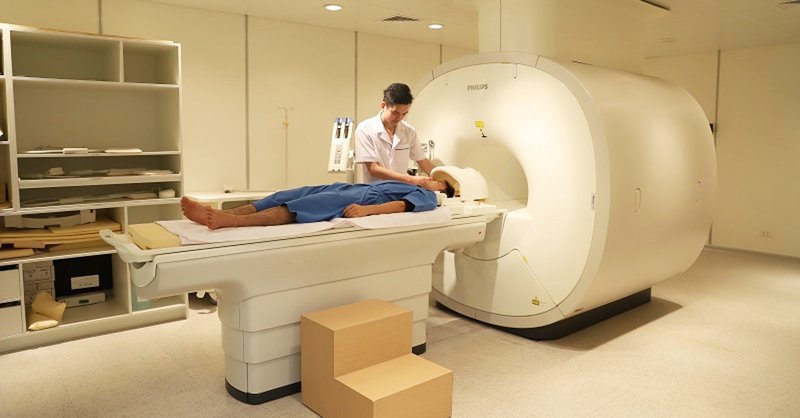
Chụp MRi giúp chẩn đoán hình ảnh về ung thư tuyến tụy
2. Pancreatic cancer treatment
The choice of treatment for pancreatic cancer often depends on the following factors:
The stage of the cancer; The location of the cancer; The patient's overall health; Personal aspirations. In most cases, all cancer cells will be removed when possible. If this is not the right option, treatment for pancreatic cancer will focus on improving quality of life and preventing the tumor from growing or causing more harm.
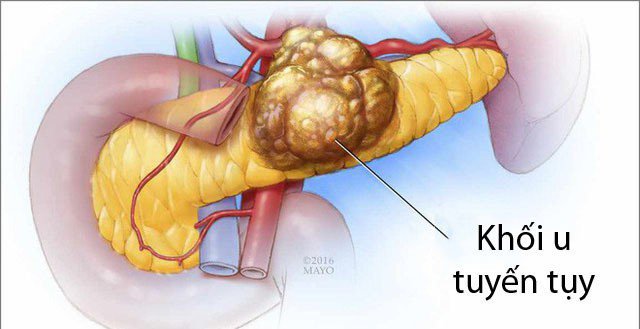
Phương pháp điều trị ung thư tuyến tụy phụ thuộc vào nhiều yếu tố
2.1. Surgery
Types of surgery commonly used in the treatment of pancreatic cancer include:
Pancreatic head tumor surgery If the tumor is located in the head of the pancreas, the doctor may perform a pancreaticoduodenectomy ( Whipple surgery). This procedure is quite complicated, the goal is to remove the head of the pancreas - including the first part of the small intestine (duodenum), the gallbladder, part of the bile duct, and nearby lymph nodes. Sometimes part of the stomach and colon may also be removed. The doctor will connect the remaining parts of the pancreas, stomach and intestines after surgery to ensure the digestion of food.
Tumor surgery in the body and tail of the pancreas The body and tail of the pancreas located on the left side of the pancreas will be removed when the tumor has formed there. In some cases, the patient also needs to remove the spleen.
Surgery to remove the entire pancreas If you have to remove the entire pancreas, you can still live a relatively normal life, but need lifelong insulin and enzyme therapy.
Surgery for tumors affecting nearby blood vessels Many people with advanced pancreatic cancer are not eligible for conventional surgery, because the tumor has involved nearby blood vessels. In a highly specialized and experienced hospital, surgeons can perform pancreatic surgery, which combines tumor resection and reconstruction of affected blood vessels.
Every surgery carries a risk of bleeding and infection. After surgery, some people will experience nausea and vomiting. You will need to stay in the hospital for a few days and then spend several weeks recuperating at home.
Research shows that surgery for pancreatic cancer causes fewer complications when performed by experienced doctors at hospitals that have performed many similar operations. Don't hesitate to ask about your doctor's and the hospital's experience with pancreatic cancer surgery.
2.2. Valence
Chemotherapy is a method of injecting into a vein or taking drugs that are capable of killing cancer cells. You may be treated for pancreatic cancer with one chemotherapy drug or a combination of several.
Sometimes chemotherapy is also combined with radiation therapy to increase effectiveness. Chemotherapy - radiation therapy is usually indicated when cancer cells have not spread outside the pancreas and metastasized to other organs. This combination can be applied before surgery to help shrink the tumor, or performed after surgery to limit the risk of pancreatic cancer recurrence.
In people with advanced pancreatic cancer that has spread to other organs, chemotherapy is indicated to control tumor growth, relieve symptoms, and prolong survival.
Sometimes chemotherapy is also combined with radiation therapy to increase effectiveness. Chemotherapy - radiation therapy is usually indicated when cancer cells have not spread outside the pancreas and metastasized to other organs. This combination can be applied before surgery to help shrink the tumor, or performed after surgery to limit the risk of pancreatic cancer recurrence.
In people with advanced pancreatic cancer that has spread to other organs, chemotherapy is indicated to control tumor growth, relieve symptoms, and prolong survival.
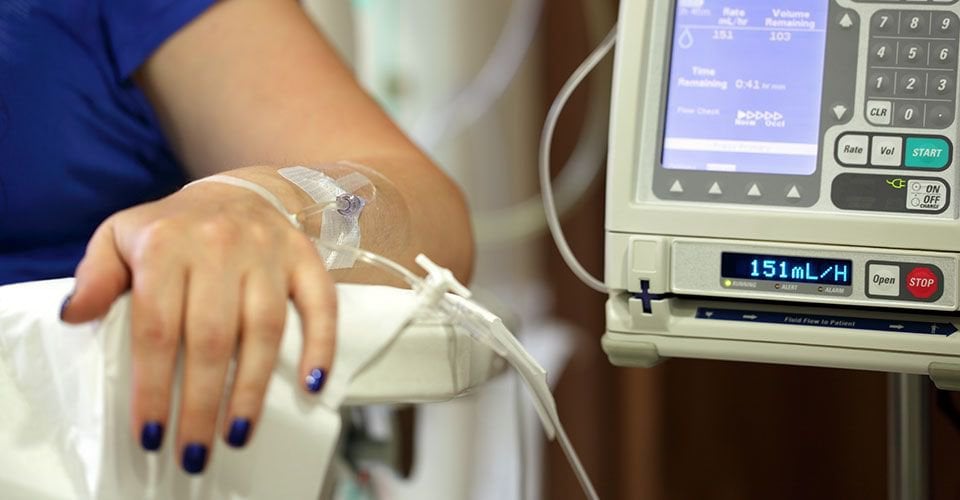
Hóa trị là một trong những phương pháp điều trị ung thư tuyến tụy
2.3. Radiotherapy
Radiation therapy uses high-energy beams, such as X-rays and protons, to kill cancer cells. You may be treated for pancreatic cancer with radiation before/after or during surgery, often in combination with chemotherapy. Your doctor may also recommend a combination of radiation therapy and chemotherapy when the cancer is inoperable.
A radiation device moves around you, directing radiation to specific points on your body (external beam radiation). Traditional radiation therapy uses X-rays to kill cancer cells, but some modern medical centers have begun using a newer form of radiation, protons. Proton therapy used to treat pancreatic cancer may cause fewer side effects than standard radiation therapy.
3. Coping with cancer
People with cancer often have to endure a lot of pain. Some studies show that pancreatic cancer causes pain even more often than other types. If you're in pain, have trouble sleeping, and think about your cancer constantly, you're more likely to get angry or sad.
Specialists can help people manage their emotions and cope with cancer in a number of ways, such as:
Acupuncture; art therapy (art therapy); Do exercise ; Massage therapy; Meditation; Music therapy; Relaxation exercises; Spirituality, religion. It is very difficult to accept that you are suffering from a life-threatening disease, you can refer to some of the following suggestions:
Learn fully and in detail about your cancer from a reliable source to give better treatment and health care decisions; Your loved ones will feel shocked and helpless when they hear that you have been diagnosed with pancreatic cancer. Allow friends and family to share, helping you with simple tasks. Not only will this give you less to worry about, but it will also put them at ease; Find someone to talk to, such as a psychologist, health social worker, a religious person, or a community of people who also have cancer to feel comfortable sharing with.

Châm cứu là phương pháp hữu hiệu đối phó với bệnh ung thư
4. How long do people with pancreatic cancer live?
Pancreatic cancer is the most difficult disease to detect in its early stages. When pancreatic cancer is diagnosed, patients are usually already in stages III and IV, when the tumor is already large. Answering the question "How long does pancreatic cancer live?", doctors said that the disease has a much lower prognosis than other types of cancer. Specifically:
If pancreatic cancer is detected and treated at an early stage, the patient has about 12 - 14% chance to live for 5 years; In stage II, patients have about 5-7% chance of survival; In stage III and stage IV, the patient's chance of survival is only about 1-3%. Normally, patients with pancreatic cancer and have clinical symptoms, the mortality rate is about 95% in the first years, the 5-year survival rate is only about 5%. The patient also had to undergo major surgery, cutting many organs in the abdomen, making the quality of life very poor.
Therefore, even though it is a rare disease, pancreatic cancer also has a death rate that is not inferior to other common cancers. Pancreatic cancer is curable or not depends very much on awareness of early disease screening. If treated aggressively in the early stages, patients still have a chance to prolong life. If you have an unfortunate family member, or a sibling with pancreatic cancer, you need to proactively screen for cancer early because the disease is hereditary.
Cancer inherently does not spare anyone, it is estimated that every year in the world, a very large proportion of people die from cancer. In fact, if cancer can be detected at an early stage, the prognosis for treatment is very high, even if it is completely cured and not recurred. Therefore, cancer screening is essential, especially for high-risk patients.
Currently, Vinmec International General Hospital has been implementing cancer screening packages. At Vinmec, there are fully modern diagnostic facilities such as: PET/CT, SPECT/CT, MRI..., blood marrow test, histopathology, immunohistochemistry test, gene test, lab test molecular biology, as well as a full range of targeted drugs, the most advanced immunotherapy drugs in cancer treatment. Multimodal cancer treatment from surgery, radiation therapy, chemotherapy, hematopoietic stem cell transplantation, targeted therapy, immunotherapy in cancer treatment, new treatments such as autoimmunotherapy body, heat therapy...
After having an accurate diagnosis of the disease and stage, the patient will be consulted to choose the most appropriate and effective treatment methods. The treatment process is always closely coordinated with many specialties: Diagnostic Imaging, Biochemistry, Immunology, Cardiology, Stem Cell and Gene Technology; Department of Obstetrics and Gynecology, Department of Endocrinology, Department of Rehabilitation, Department of Psychology, Department of Nutrition... to bring the highest efficiency and comfort to patients. After undergoing the treatment phase, the patient will also be monitored and re-examined to determine whether the cancer treatment is effective or not.
Thanks to modern facilities, a team of qualified doctors and excellent medical services, have brought confidence, health and good quality of life to patients who come to visit and treat diseases at the hospital. Vinmec.
To register for examination and treatment at Vinmec International General Hospital, please book an appointment on the website for service.
References: mayoclinic.org, cancer.org, healthline.com
Để đặt lịch khám tại viện, Quý khách vui lòng bấm số HOTLINE hoặc đặt lịch trực tiếp TẠI ĐÂY. Tải và đặt lịch khám tự động trên ứng dụng MyVinmec để quản lý, theo dõi lịch và đặt hẹn mọi lúc mọi nơi ngay trên ứng dụng.




